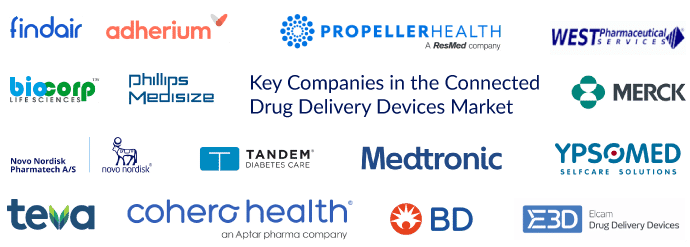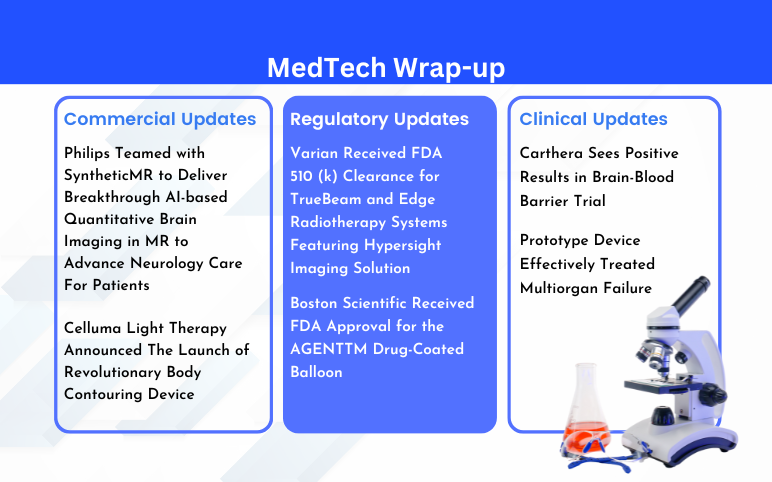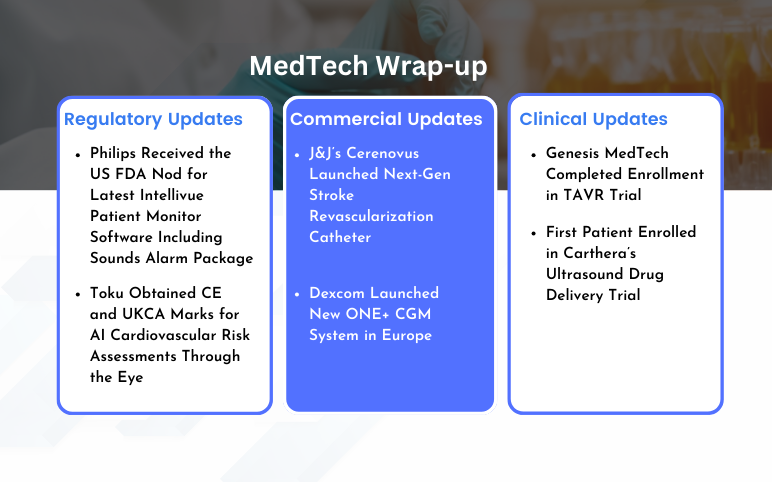How Connected Drug Delivery Devices are Improving the Patient Outcomes?
Apr 05, 2023
Table of Contents
Connected drug delivery devices are one of the most anticipated and highly evolving topics in the healthcare domain. It is gaining significant attention among people, healthcare providers, and healthcare institutions due to its beneficial outcomes. The connected drug delivery devices can provide treatment to patients in a home care setting, avoiding frequent visits to healthcare professionals for dose administration. To the healthcare system, it is reducing the burden by enabling patient self-management wherever possible and frees up time and resources for other health services. Connected drug delivery systems allow physicians to track and analyze the dose regimen and the effectiveness of their patients to adhere to their prescribed treatments. Similarly, they can adjust the patient’s care whenever required. The physicians were able to track the dose regimen of a patient regularly through the connected drug delivery devices.
Connected drug delivery devices are equipped with a sensor that facilitates connection and data transfer to servers/applications via Near Field Communication (NFC), Bluetooth, or cellular networks. With the growing innovation and technological advancements, the connected drug delivery devices market is gaining immense growth. As per the latest market assessment by DelveInsight, the global connected drug delivery devices market is estimated to grow at a CAGR of 23.59% during the forecast period (2023-28). Similarly, connected drug delivery devices are highly accepted for handling various issues and effectively addressing diseases with better management protocols. Connected drug delivery ensures greater adherence and tracking to medications. Moreover, some of the devices provide additional features like reminders. For chronic diseases such as diabetes, asthma, and others, connected drug delivery devices can be a highly valuable tool for self-medication management. The rise in the number of patients suffering from these diseases is leading to an increase in the demand for connected drug delivery devices, thereby leading to an overall rise in the drug delivery devices market growth.
Downloads
Click Here To Get the Article in PDF
Recent Articles
- Philips Teamed with SyntheticMR; BioPhotas’s Celluma Light Therapy; Boston Scientific’s AGE...
- Neuspera Medical’s Nuvella System; Abbott Presented the Data for FreeStyle Libre 2 System; ZEISS ...
- Nanomedicine Market: Evaluating the Pioneering Innovations and Future Growth Prospects
- Cerenovus Launched Next-Gen Stroke Revascularization Catheter; Dexcom Launched New ONE+ CGM Syste...
- How Are Innovations in Drug Delivery Devices Solving the Complex Challenges in the Market?
Connected Drug Delivery Devices Overview and Products Types
Connected drug delivery devices are wirelessly connected to smart electronic devices that allow patient-administered therapy. These drug delivery devices consist of electronics and sensors that can effectively track dose delivery and timing and provide immediate feedback to concerned patients or healthcare providers. In recent years, immense growth and development have been registered in the connected drug delivery devices segment. Several players are active in the domain and working to deliver new products and devices to cater to the consumer’s different needs and grab the market share. As per the product type, the connected drug delivery devices are segmented as connected sensors (connected inhaler sensors and connectable injection sensors) and integrated connected devices (connected inhaler devices and connected injection devices). Similarly, as per the technology type, connected drug delivery devices come with technologies such as Bluetooth, Near-Field Communication (NFC), and others. Similarly, companies are working extensively to develop new and innovative products based on the latest technologies. The connected drug delivery devices have applications across various therapeutic areas, such as metabolic, respiratory, and hormonal disorders.
As per DelveInsight’s estimate, in the product segment of the connected drug delivery devices market, the Bluetooth category generates a significant revenue share owing to the higher utilization of technology to connect drug delivery devices to smartphones or other related products. Moreover, Bluetooth technology is highly compatible with other drug delivery devices, and ease of use is expected to drive the demand in the coming years. Similarly, several major players are active in the Bluetooth category of the connected drug delivery devices market, thereby stimulating the strategic activities by the key players will also drive the market of Bluetooth-connected drug delivery devices.
Connected Drug Delivery Devices Market Dynamics
In recent years, the global burden of chronic disease has grown immensely, driving the demand for various Drug Delivery Devices. Similarly, connected drug delivery devices demand is also gaining pace. The rising case of Diabetes is one of the key factors for the higher growth of connected drug delivery devices. It is observed that, in 2021, approximately 537 million adults (20–79 years) were living with diabetes globally. Also, the total number of people living with diabetes is projected to rise to 643 million by 2030 and 783 million by 2045. The increasing prevalence of diabetes is immensely driving the demand for insulin patches, pens, infusion pumps, and others, a type of connected drug delivery device.
Another important factor driving the market growth is the rising need to improve patient medication adherence. As more patients use connected drug delivery devices, they can manage their treatment more efficiently by reducing the number of visits to clinics and hospitals. Connected devices aid in proper dosage and administration, resulting in a successful treatment without the need for costly secondary interventions. These systems also include reminders and adherence trackers, which make it easier for patients to stick to their medication regimen.
Similarly, other major factors, such as the increasing patient engagement and connectivity due to the rising penetration of the Internet of Things (IoT) in the medical devices sector, are also likely to boost market growth. Moreover, various strategic activities such as collaboration, acquisitions, and partnerships, among others, are also propelling market growth. In the upcoming years, connected drug delivery devices can be an essential part of remote patient monitoring for patients with diseases like respiratory, metabolic, and hormonal disorders. However, some of the key aspects associated with connected drug delivery devices, such as security and data breaching concerns, environmental concerns for electronic waste disposal, and others, may restrict the market growth.
Role of Mobile Apps in the Connected Drug Delivery Devices Market
The role of mobile devices and apps is growing in the healthcare market. The use of mobile devices helps in making more rapid decisions with a lower error rate, while ensuring high-quality of data management and its accessibility. To healthcare professionals, apps assist in improving practice efficiency and knowledge. Similarly, the importance of smartphone apps is expected to grow immensely in the Connected Drug Delivery Device ecosystem. Apps can play a key role in working and evaluating the connected device. They can provide help in data upload and act as a user interface for patients to track and manage their treatment journey. Most of the emerging connected drug delivery devices are compatible with smartphone apps, thereby allowing better healthcare delivery. The development of new-age technologies such as 5G and edge computing and the integration of cloud computing are improving the performance of the connected drug delivery devices with real-time data transfer and easy monitoring. Most importantly, these benefits have been shown to positively affect patient care outcomes, as evidenced by a reduction in adverse events and hospital length of stay.

Connected Drug Delivery Devices – Regional Market Assessment
Among all the regions, North America is anticipated to hold the largest market share of the connected drug delivery devices market in the upcoming year. The United States accounts for the major share in North America and the globally connected drug delivery devices market owing to the rising prevalence of asthma, diabetes, and others in the US population. Some of the key factors for the high growth of the connected drug delivery devices market in North America are the rising prevalence of chronic diseases, the aging population prone to chronic diseases, and rising government initiatives regarding disease awareness of the self-administration of drugs using connected drug delivery devices. Moreover, the high disposable income, sophisticated healthcare infrastructure, regulatory approval for new products, and high awareness are other major drivers for the connected drug delivery devices market growth. Coupled with the above-mentioned factors, the increasing product approvals by the regulatory authorities and launches by MedTech also play a key role in boosting regional product demand.
Major Clinical, Commercial, and Regulatory Developments in the Connected Drug Delivery Devices Market
- In October 2022, ALCOR and Merck KGaA agreed to the development and supply of a specific version of Mallya device as an accessory for one of Merck KGaA, Darmstadt, Germany’s drug delivery devices. Mallya is a Bluetooth-enabled clip-on device for pen injectors that collects the dose and time of each injection and transfers information in real-time to companion software.
- In July 2022, Adherium Limited, a leader in respiratory eHealth, remote monitoring, and data management solutions, announced that it had received U.S. Food and Drug Administration (FDA) 510(k) clearance to market application connecting GlaxoSmithKline’s (GSK) Ellipta® inhaler users with Adherium’s new, next-generation Hailie sensor with physiological parameters for monitoring Asthma and COPD medication use.
- In February 2022, Aptar Pharma announced the launch of HeroTracker Sense, a breakthrough digital respiratory healthcare system that transforms a typically metered dose inhaler into a smart linked healthcare system.
- In May 2021, Eli Lilly and Company collaborated with 4 companies- Glooko Inc., DexCom, Inc., Roche, and myDiabby Healthcare– to advance connected solutions for diabetics in markets outside the US.
- In June 2020, Propeller Health entered into a partnership with Novartis. By entering into the partnership, Propeller’s digital health platform will co-package Novartis’ Enerzair Breezhaler to treat patients suffering from asthma.
- In July 2020, Novartis received EC approval for Enerzair® Breezhaler, which is used as a maintenance treatment of asthma in adult patients. The inhaler is connected to the app using Bluetooth technology.
Connected Drug Delivery Devices Market Key Players:
Globally, several major MedTech giants are actively working in the connected drug delivery devices market. The leading players active in the domain include Findair, Adherium, Propeller Health., West Pharmaceutical Services, Inc., BIOCORP, Phillips-Medisize, Merck KGaA, Novo Nordisk A/S, Medtronic, Tandem Diabetes Care, Inc., Ypsomed, Teva Pharmaceutical Industries Ltd., Elcam Medical, Cohero Health, Inc., BD., and others. Owing to growing awareness and rising demand, several major players are anticipated to enter the connected drug delivery devices market in the upcoming years.
Connected Drug Delivery Devices Market Future Perspective and Analysis
Connected drug delivery devices have gained immense attention from payers, clinicians, patients, regulatory authorities, and pharmaceutical companies over a short period of time and have evolved rapidly over the last two decades. In the coming years, connected drug delivery devices are anticipated to evolve as more and more companies are working in the domain to launch new and innovative devices and capture the market share. The demand for connected drug delivery devices is also growing immensely, owing to the increasing geriatric population, rising prevalence of chronic diseases, the rising awareness about adherence to prescribed therapies, and self-administration of drugs & innovation in product development, among others.
Currently, several studies are going on to assess the potential of connected drug delivery devices that can aid in drug delivery in the home setting with improved technical specifications. The upcoming devices are adjusted to assess the patient’s age and general customization to individual patient needs as per the diseases, among others. The devices are anticipated to deliver superior outcomes with advanced features such as user-centered design, alarm setting and alerts for the dose administration, continuous examination of the dose regimen and disease monitoring, and others to improve patient treatment outcomes and improved compliance with the treatment regimen. Overall, the connected drug delivery devices market is expected to transform the healthcare ecosystem with several potential benefits that ensure a high quality of care by enabling early and better treatment decisions while supporting drug administration in a decentralized setting.

Downloads
Article in PDF
Recent Articles
- Nanomedicine Market: Evaluating the Pioneering Innovations and Future Growth Prospects
- Philips Teamed with SyntheticMR; BioPhotas’s Celluma Light Therapy; Boston Scientific’s AGE...
- Neuspera Medical’s Nuvella System; Abbott Presented the Data for FreeStyle Libre 2 System; ZEISS ...
- How Are Innovations in Drug Delivery Devices Solving the Complex Challenges in the Market?
- Cerenovus Launched Next-Gen Stroke Revascularization Catheter; Dexcom Launched New ONE+ CGM Syste...




